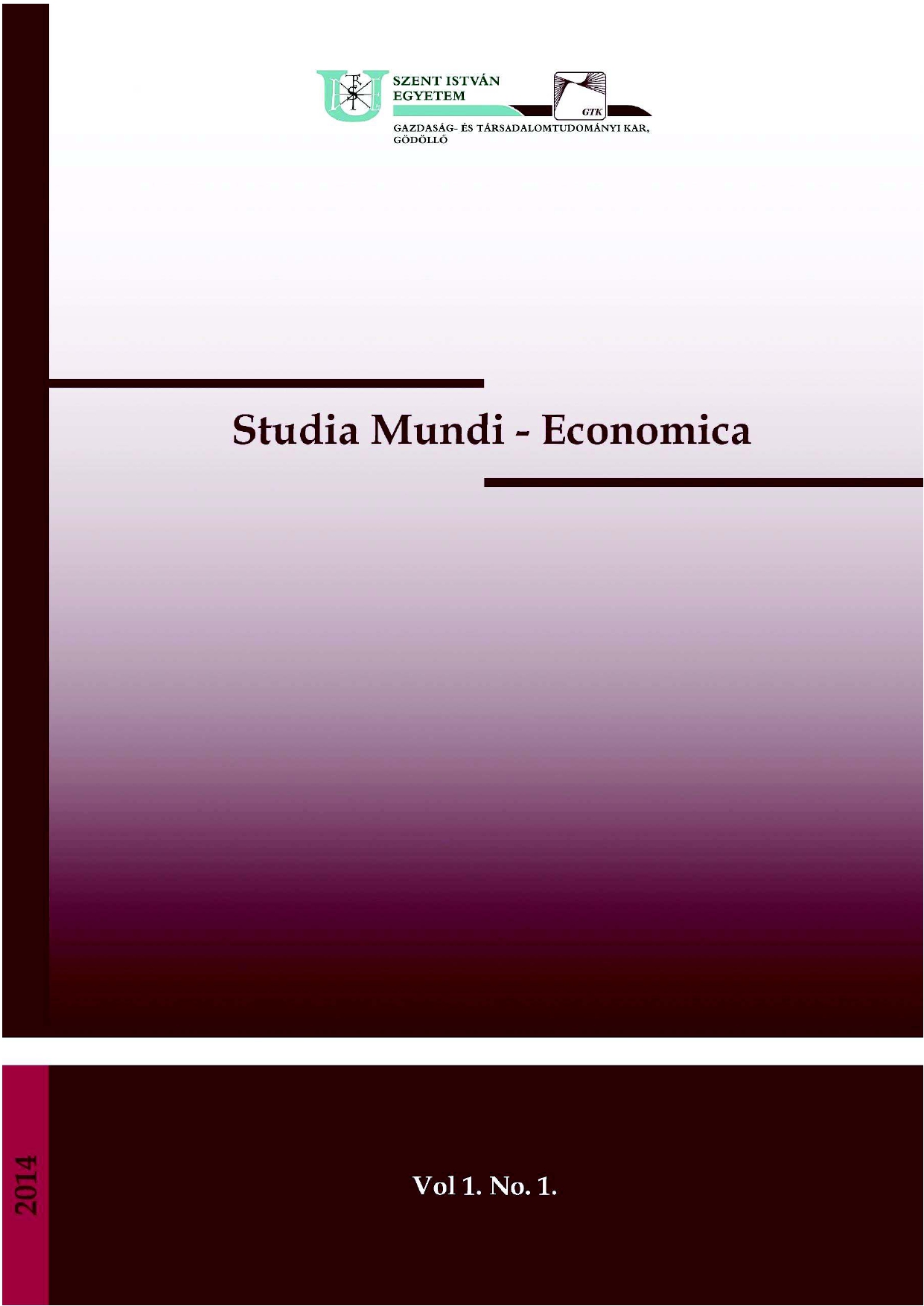Evolution of cafeteria systems – past-present and future
DOI:
https://doi.org/10.18531/Studia.Mundi.2014.01.01.87-97Kulcsszavak:
fringe benefits, flexible remuneration, cafeteria benefits, HungaryAbsztrakt
The authors first review the most important features of the cafeteria system (goals, typical ‘stakeholders’ and strategic HR issues). Then they examine the evolution of the system of flexible benefits since 1996, when the first such systems appeared in Hungary. Authors also analyze how the main drivers caused the changes, and how the key players of the cafeteria systems adapted themselves to these movements. The reader can also find insight into the major changes for 2012 and the potential impact of these changes on benefit policies of Hungarian firms. They also touch upon the findings of empirical surveys that the cafeteria systems are significantly influenced mainly by the size of organizations and to a lesser extent by form of ownership.
Hivatkozások
Adókódex (Tax Bulletin) (1996). Budapest: Pénzügyminisztérium Adóigazgatási Főosztálya (Ministry of Finance)
Antalóczy, K. - Sass, M. (2005). A külföldi működő tőke befektetések regionális elhelyezkedése és gazdasági hatása Magyarországon (Regional deployment and economic impacts of Foreign Direct Investments in Hungary). Közgazdasági Szemle (Hungarian Economic Review) May: pp. 494-520.
Artz, B. (2010). Fringe benefits and job satisfaction. International Journal of Manpower, Vol.31, Issue 6, pp. 626-644. DOI: http://dx.doi.org/10.1108/01437721011073346
Begella, Z-né. - Badak, B. (2007). Bérek kívüli juttatások rendszere. (Benefit systems in Hungary) Opten Kft., Budapest.
Bencsik, N. (2004). A béren kívüli juttatások (Benefits in Hungary) Budapest: Humánpolitikai Konferencia (Personnel Management Conference).
Canrinus, E., Helms - Lorenz, M. - Beijaard, D. - Buitink, J. - Hofman, A. (2012). Self-efficacy, job satisfaction, motivation and commitment: exploring the relationships between indicators of teachers’ professional identity. European Journal of Psychology of Education. Vol.27, Issue 1, pp. 115-132. DOI: http://dx.doi.org/10.1007/s10212-011-0069-2
Doerner, W. M. - Doerner, W.G. (2012). Collective Bargaining and Job Benefits in Florida Municipal Police Agencies. American Journal of Criminal Justice, October, DOI: http://dx.doi.org/10.1007/s12103-012-9187-x
Dorantes, A., - Mach.T. (2009). Performance pay and fringe benefits: Work incentives or compensating wage differentials: International Journal of Manpower, Vol. 24, Issue 6, pp. 672-735. DOI: http://dx.doi.org/10.1108/01437720310496157
Előterjesztés a Kormány részére a béren kívüli juttatások rendszerének átalakításáról. (Proposal for Hungarian Government of Development of Flexible Benefit Systems in Hungary). Retrieved from http://www.brdsz.hu/html/main/2011/bk-eloterjesztes.pdf on 30 October 2011.
Ember. A. (2008). A választható béren kívüli juttatások rendszere (Flexible Benefits in Hungary) Jogi Szemle (Legal review) Vol. 3. Issue 2, pp. 120-141.
Flexible Benefits Research (2011). Employee Benefits, March 2011, Supplement.
Herczeg, D. (2004): A béren kívüli juttatások és a munkatársi elkötelezettség összefüggései (Relationships between Flexible benefits and Employee Commitments) Munkaügyi Szemle (Hungarian Labor Review), Issue 3, pp. 54-69.
Hippler, T. (2010): Employee benefits pros’futures linger in reform details International Journal of Human Resource Management. Vol.21, Issue 11, pp. 1837-1862.
HVG különszámai (Supplement) (1996 -2012), HVG. Budapest.
Kaufmann, X. (2013) Variations of Fringe Benefits in Great Britain, Sweden, France and Germany between Employers and Employees. International Economic Review, Vol.52, Issue 4. pp. 1105-1122.
Lowen, A. (2009): “Family-Friendly’ Fringe Benefits and the Gender Wage Gap. Journal of Labor Research, Vol. 30, Issue 2, pp. 101-119. DOI: http://dx.doi.org/10.1007/s12122-008-9046-1
Malatyinszki, Sz. (2009): A válság hatása az emberi erőforrásokra. IImpacts of Economic Crises on Human Resources) Gödöllő: Szent István University.
Milkovich, G., T. - Newman, J. M.- Gerhart, B. (2011): Compensation,. McGraw-Hill International, New York.
OHE Cafeteria felmérés (Cafeteria Research Report (2011). Budapest: Országos Humánpolitikai Egyesület (National HR Association).
Poór, J. (ed.) (2007): Rugalmas ösztönzés – rugalmas juttatások. (Flexible Remuneration – Flexible Benefits) (2. Ed.) Budapest: Complex Publishing House.
Poór, J., - Kolbe, T. - Marjai, B. (2009). Változások a juttatások és a cafeteria-rendszerek menedzselése területén Magyarország 2010. (kutatási tanulmány) (Changes in Cafeteria and Benefeti Management in Hungary 2009). Pécs: PTE Menedzsment és HR Kutató Központ, Pécs.
Poór, J. - Beke, J. - László, Gy. - Marjai, B. - Kolbe, T. – Óhegyi, K. (2011). Juttatások - Magyarország 2011. Múlt – Jelen – Jövő. (kutatási tanulmány) (Benefits in Hungary – Past-Present and Future – Research Report). Gödöllő: SZIE Menedzsment és HR Kutató Központ-Nexon Magyarország Kft.
Poór, J. - Beke, J. - Óhegyi, K. (2012). Juttatások Magyarország. (kutatási tanulmány) (Benefits in Hungary – Research Report). Gödöllő: SZIE Menedzsment és HR Kutató Központ-Nexon Magyarország Kft.
Poór, J. (2012). Nemzetköziesedés és globalizáció az emberi erőforrás menedzsmentben. (kézirat) (Internationalization and Globalization in HRM). Budapest: Complex Publishing House.
Sass, M. (2007): Hogyan befolyásolják a külső szereplők a magyar vállalatok versenyképességét? (How Impact Foreign Firms Competitivenes of Hungarian Companies?). Külgazdaság (Foreign Trade Review), July-August, pp.37-57.
Személyi jövedelemadóról szóló törvény (1995.évi CXVII), illetve annak módosításai.(Amandments of Personal Taxation in Hungary)
Tali, K. - Cohen, Y. - Guy, M. (2010). Fringe Benefits and Income Inequality. Journal of Business, Vol.27, Issue 5, pp. 17-19.
Törő E. (2005): A magyar cafetériarendszer az adójogi változások tükrében. (Cafeteria in Hungary in Light of Amandments of Personal Taxation) Debrecen: University Debrecen.
Reddick, M. - Christopher, G. (2009): The Importance of Employee Health Benefits to Public and Private Sector Organizations. Public Personnel Management, Vol. 38, Issue 2, pp. 49-68. DOI: http://dx.doi.org/10.1177/009102600903800204
Letöltések
Megjelent
Folyóirat szám
Rovat
License

This work is licensed under a Creative Commons Attribution-NonCommercial-NoDerivatives 4.0 International License.
A folyóirat Open Access (Gold). Cikkeire a Creative Commons 4.0 standard licenc alábbi típusa vonatkozik: CC-BY-NC-ND-4.0. Ennek értelmében a mű szabadon másolható, terjeszthető, bemutatható és előadható, azonban nem használható fel kereskedelmi célokra (NC), továbbá nem módosítható és nem készíthető belőle átdolgozás, származékos mű (ND). A licenc alapján a szerző vagy a jogosult által meghatározott módon fel kell tüntetni a szerző nevét és a szerzői mű címét (BY).






